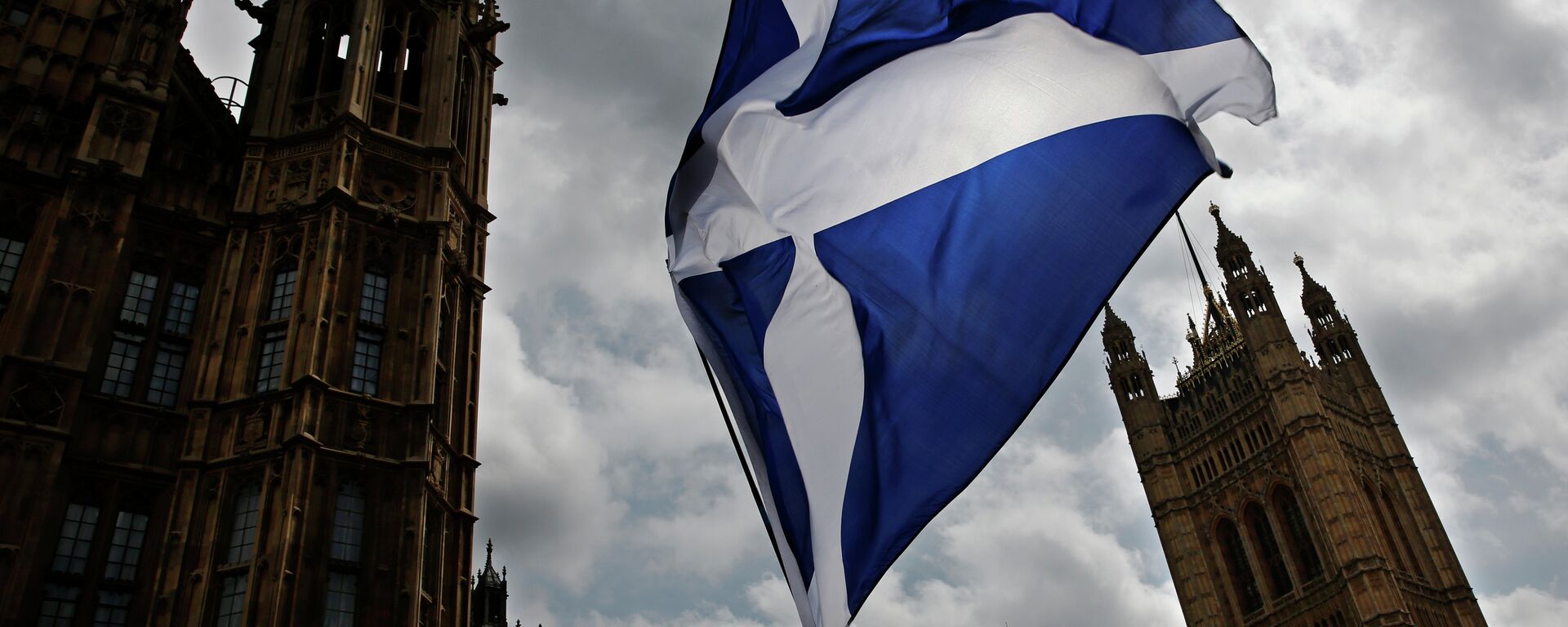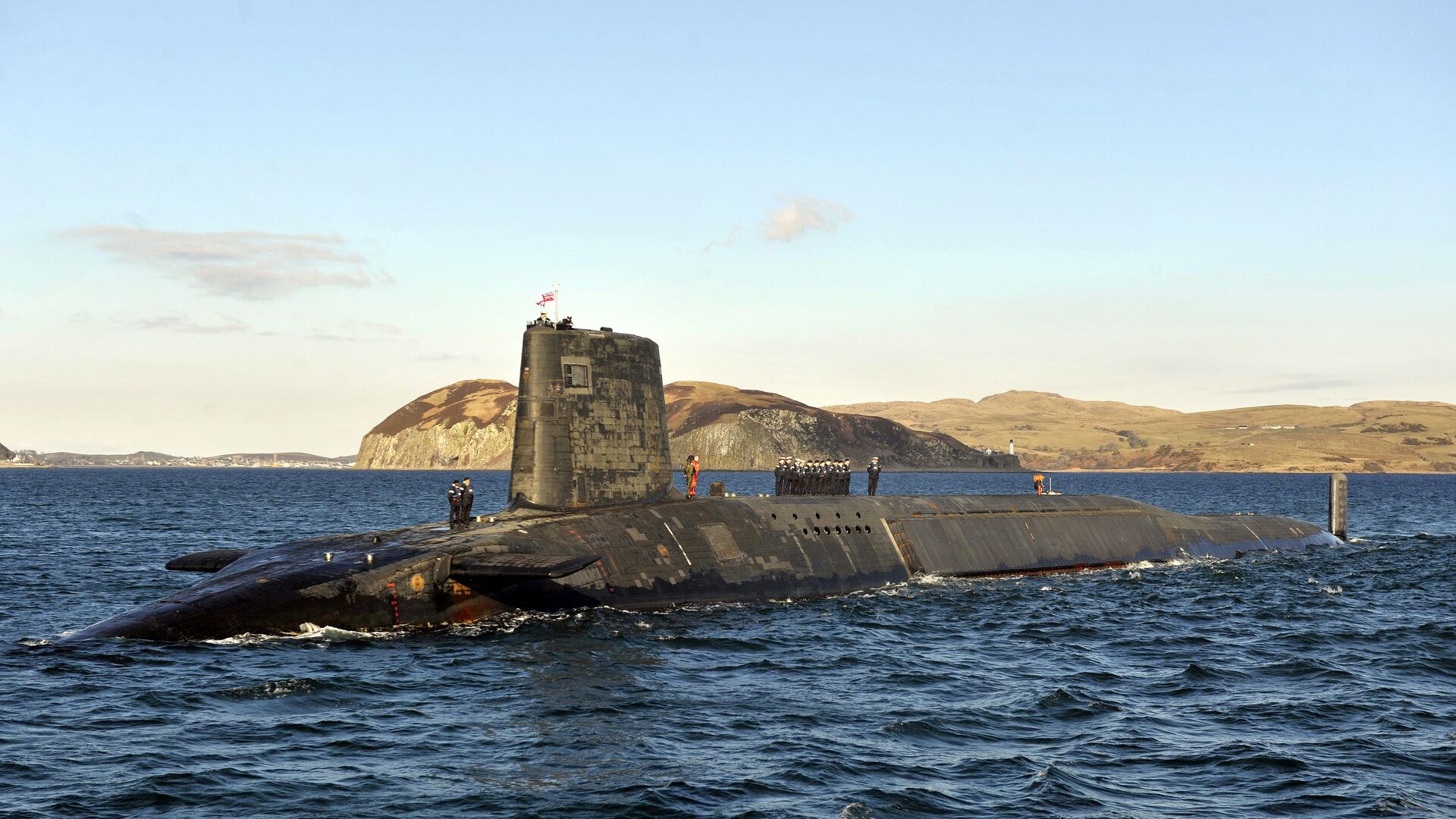https://sputnikglobe.com/20210902/uk-denies-it-has-secret-plan-to-move-trident-nuclear-subs-to-us-if-scotland-gains-independence-1083774381.html
UK Denies It Has 'Secret Plan' to Move Trident Nuclear Subs to US If Scotland Gains Independence
UK Denies It Has 'Secret Plan' to Move Trident Nuclear Subs to US If Scotland Gains Independence
Sputnik International
Early last month, UK Minister for the Cabinet Office Michael Gove said that the government would let Scotland hold a second independence referendum if there is... 02.09.2021, Sputnik International
2021-09-02T05:47+0000
2021-09-02T05:47+0000
2023-05-28T15:15+0000
newsfeed
world
britain
france
boris johnson
trident
nuclear submarines
government
security
us
https://cdn1.img.sputnikglobe.com/img/104322/83/1043228311_0:36:4131:2360_1920x0_80_0_0_de803f55be546e3ba8d6ee18a6d62c9f.jpg
The UK Ministry of Defence (MoD) has rejected reports about the government's plans to relocate Britain's Trident nuclear submarines abroad in the event of Scottish independence.The Trident nuclear weapons system, based on Scotland's west coast, consists of four British submarines armed with eight missiles, each carrying 40 nuclear warheads. At least one such vessel is at sea continuously, carrying the nuclear arsenal.The spokesperson was echoed by the MoD's press office, which tweeted that "contrary to a recent press report, the nuclear deterrent and the thousands of jobs which support it are staying in Scotland".The Scottish government, in contrast, told the Financial Times (FT) that it firmly opposes the possession and the use of nuclear weapons and that it was "committed to the safe and complete withdrawal of Trident from Scotland".The statement follows the FT quoting unnamed sources as claiming that the UK is making "secret contingency plans" to move its Trident nuclear submarine bases from Scotland to the US or France if the northernmost part of the UK gains independence.Another option reportedly under consideration is Britain negotiating a long-term lease for the Royal Navy's nuclear bases at their current location on the country's west coast.This will allegedly lead to the creation of a new British Overseas Territory within an independent Scottish state's Faslane and Coulport bases that were described by one source as a "Nuclear Gibraltar".UK Reveals When It Might Approve Scottish Independence ReferendumThe claims come after Scotland Secretary Alister Jack told the news outlet Politico last week that the UK government could approve a second Scottish independence referendum if support for holding one remained above 60 percent over a sustained period.This was preceded by UK Minister for the Cabinet Office Michael Gove saying in an interview with the Sunday Mail in early August that "if it is the case that there is clearly a settled will in favour of a referendum, then one will occur".Earlier, Scotland's First Minister Nicola Sturgeon told British Prime Minister Boris Johnson that a second independence vote is "a matter of when - not if".During the 2016 referendum on membership in the European Union, Scotland largely voted against Brexit. Scottish voters were first asked whether they wanted independence for Scotland in a September 2014 referendum, with 55% voting against it.The government in Holyrood has since proposed a second referendum, which hasn't been approved yet as Prime Minister Johnson has repeatedly opposed the idea.
https://sputnikglobe.com/20201130/scottish-first-minister-sturgeon-the-sooner-we-can-have-independence-the-better-for-all-of-us-1081314872.html
britain
france
united kingdom (uk)
Sputnik International
feedback@sputniknews.com
+74956456601
MIA „Rossiya Segodnya“
2021
Oleg Burunov
https://cdn1.img.sputnikglobe.com/img/07e4/09/0b/1080424846_0:0:2048:2048_100x100_80_0_0_3d7b461f8a98586fa3fe739930816aea.jpg
Oleg Burunov
https://cdn1.img.sputnikglobe.com/img/07e4/09/0b/1080424846_0:0:2048:2048_100x100_80_0_0_3d7b461f8a98586fa3fe739930816aea.jpg
News
en_EN
Sputnik International
feedback@sputniknews.com
+74956456601
MIA „Rossiya Segodnya“
Sputnik International
feedback@sputniknews.com
+74956456601
MIA „Rossiya Segodnya“
Oleg Burunov
https://cdn1.img.sputnikglobe.com/img/07e4/09/0b/1080424846_0:0:2048:2048_100x100_80_0_0_3d7b461f8a98586fa3fe739930816aea.jpg
newsfeed, britain, france, boris johnson, trident, nuclear submarines, government, security, us, united kingdom (uk)
newsfeed, britain, france, boris johnson, trident, nuclear submarines, government, security, us, united kingdom (uk)
UK Denies It Has 'Secret Plan' to Move Trident Nuclear Subs to US If Scotland Gains Independence
05:47 GMT 02.09.2021 (Updated: 15:15 GMT 28.05.2023) Early last month, UK Minister for the Cabinet Office Michael Gove said that the government would let Scotland hold a second independence referendum if there is a "settled will" on the part of the public.
The UK Ministry of Defence (MoD) has rejected reports about the government's plans to relocate Britain's Trident nuclear submarines abroad in the event of Scottish independence.
The Trident nuclear weapons system, based on Scotland's west coast, consists of four British submarines armed with eight missiles, each carrying 40 nuclear warheads. At least one such vessel is at sea continuously, carrying the nuclear arsenal.
A MoD spokesperson was cited by The Independent as saying on Wednesday that "there are no plans to move the nuclear deterrent from HM Naval Base Clyde, which contributes to Scotland's and the wider UK's security and economy, and its supporting facilities are safe for local communities".
The spokesperson was echoed by the MoD's press office, which tweeted that "contrary to a recent press report, the nuclear deterrent and the thousands of jobs which support it are staying in Scotland".
The Scottish government, in contrast, told the Financial Times (FT) that it firmly opposes the possession and the use of nuclear weapons and that it was "committed to the safe and complete withdrawal of Trident from Scotland".
The statement follows the FT quoting unnamed sources as claiming that the UK is making "secret contingency plans" to move its Trident nuclear submarine bases from Scotland to the US or France if the northernmost part of the UK gains independence.
"Moving the bases to the US is the preferred option of the UK Treasury, as it would require minimal capital investment", the sources argued, adding that "basing Trident outside Britain could be politically difficult, as it would likely be viewed as a threat to defence sovereignty".
Another option reportedly under consideration is Britain negotiating a long-term lease for the Royal Navy's nuclear bases at their current location on the country's west coast.
This will allegedly lead to the creation of a new British Overseas Territory within an independent Scottish state's Faslane and Coulport bases that were described by one source as a "Nuclear Gibraltar".
UK Reveals When It Might Approve Scottish Independence Referendum
The claims come after Scotland Secretary Alister Jack told the news outlet
Politico last week that the UK government could approve
a second Scottish independence referendum if support for holding one remained above 60 percent over a sustained period.
"If you consistently saw 60% of the population wanting a referendum – not wanting independence but wanting a referendum – and that was sustained over a reasonably long period, then I would acknowledge that there was a desire for a referendum", Jack said.
This was preceded by UK Minister for the Cabinet Office Michael Gove saying in an interview with the Sunday Mail in early August that "if it is the case that there is clearly a settled will in favour of a referendum, then one will occur".

30 November 2020, 07:48 GMT
Earlier, Scotland's First Minister Nicola Sturgeon told
British Prime Minister Boris Johnson that a second independence vote is "a matter of when - not if".
During the 2016 referendum on membership in the European Union, Scotland largely voted against Brexit. Scottish voters were first asked whether they wanted independence for Scotland in a September 2014 referendum, with 55% voting against it.
The government in Holyrood has since proposed a second referendum, which hasn't been approved yet as Prime Minister Johnson has repeatedly opposed the idea.




